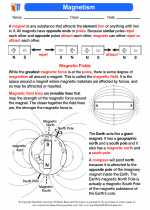Magnetism
Magnetism is a fundamental force of nature that is caused by the motion of electric charges. It is the force that causes certain materials to attract or repel each other. The study of magnetism is important in understanding a wide range of natural phenomena and has practical applications in many areas of science and technology.
Magnetic Materials
Materials that can be attracted by a magnet are called ferromagnetic materials. These include iron, nickel, and cobalt. Other materials, such as copper and aluminum, are not attracted to magnets and are called non-magnetic materials.
Magnetic Fields
When a magnet is placed near another object, it creates a magnetic field around itself. This field exerts a force on other magnets or magnetic materials within its influence. The direction of the magnetic field lines gives the direction of the force that a north pole would experience at any point.
Magnetic Poles
Every magnet has two ends or poles, called the north pole and the south pole. Like poles repel each other, and unlike poles attract each other. This is known as the law of magnetic poles.
Electromagnetism
When an electric current flows through a wire, it creates a magnetic field around the wire. This phenomenon, known as electromagnetism, is the basis for the operation of electric motors, generators, and many other devices.
Study Guide
- What is magnetism and what causes it?
- Identify at least three ferromagnetic materials and three non-magnetic materials.
- Explain what a magnetic field is and how it exerts force on other objects.
- Describe the behavior of magnetic poles according to the law of magnetic poles.
- What is electromagnetism and give examples of its practical applications.
Understanding the principles of magnetism is important in many scientific and technological fields. It forms the basis for the operation of electric motors, generators, and various electronic devices. It also plays a crucial role in the Earth's magnetic field and has applications in medicine, such as in magnetic resonance imaging (MRI).
.◂Science Worksheets and Study Guides Sixth Grade. Magnetism

 Activity Lesson
Activity Lesson
 Worksheet/Answer key
Worksheet/Answer key
 Worksheet/Answer key
Worksheet/Answer key
 Worksheet/Answer key
Worksheet/Answer key
 Worksheet/Answer key
Worksheet/Answer key
 Vocabulary/Answer key
Vocabulary/Answer key
